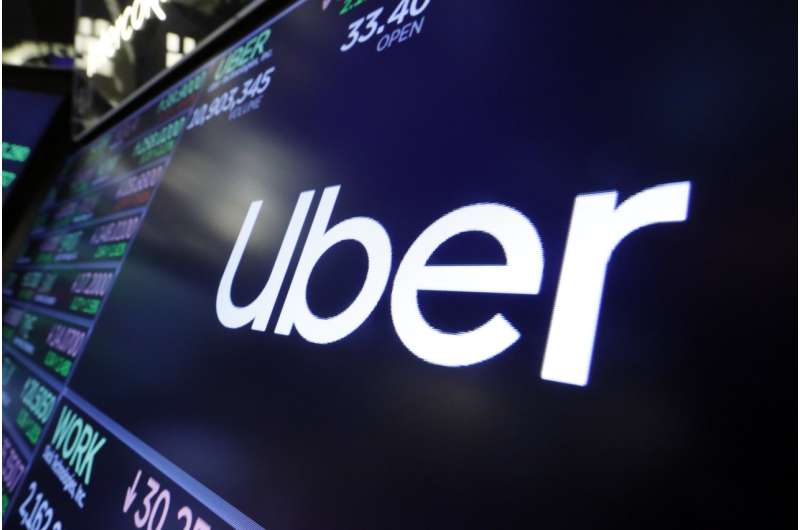In this Aug. 16, 2019 file photo, the logo for Uber appears above a trading post on the floor of the New York Stock Exchange. Uber on Thursday, Nov. 4, 2021 posted a big rebound in third-quarter revenue thanks to riders and drivers returning from pandemic lockdowns, but its bottom-line loss was wider than Wall Street expected. Credit: AP Photo/Richard Drew, File
Uber on Thursday posted a big rebound in third-quarter revenue thanks to riders and drivers returning from pandemic lockdowns, but its bottom-line loss was wider than Wall Street expected.
The San Francisco-based ride-hailing company said its third-quarter loss widened to $2.42 billion, or $1.28 per share, from $1.1 billion, or 62 cents per share, in the year earlier quarter.
The latest quarter included stock-based compensation costs as well as a hefty unrealized loss related to its investment in Didi. The Chinese ride-sharing company went public on the New York Stock Exchange in late June and days later faced a cybersecurity review from China's internet watchdog. Uber put the pretax impact of Didi's decline at $3.2 billion, partially offset by unrealized gains in Zomato and other investments.
Revenue in the quarter that ended Sept. 30 grew 72% year over year to $4.85 billion as gross bookings rose 57% to $23.1 billion. The company noted that mobility gross bookings over Halloween weekend—after the quarter ended—surpassed 2019 levels.
On average, analysts surveyed by FactSet forecast a loss of 33 cents per share on revenue of $4.42 billion.
Uber said its adjusted earnings before interest, taxes, depreciation and amortization—or EBITDA—totaled $8 million during the quarter, turning positive for the first time in the company's history. Its restaurant delivery segment also is close to breakeven.
For the fourth quarter, Uber Technologies Inc. expects gross bookings of $25 billion to $26 billion and adjusted EBITDA of $25 million to $75 million.
Shares in Uber Technologies Inc. rose about 1% in after-hours trading. The stock is down roughly 11% in the year to date.
© 2021 The Associated Press. All rights reserved. This material may not be published, broadcast, rewritten or redistributed without permission.
























